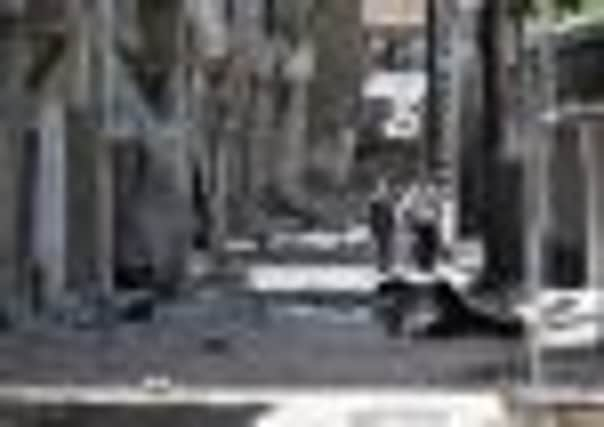Syria: As crackdown takes its toll, rebels turn to assassination


Syrian president Bashar al- Assad’s opponents are resorting increasingly to assassinations of loyalist military officers in an escalation of their campaign to bring down the regime. At least ten senior officers, including several generals, have been gunned down in the past three months, many of them as they left home in the morning to head towork.
The latest occurred on Tuesday, when attackers shot and killed a retired lieutenant colonel and his brother, a chief warrant officer, at a DIY shop in the capital, the state news agency reported. Elsewhere in Damascus, an intelligence officer was killed, opposition activists said.
Advertisement
Hide AdAdvertisement
Hide AdSuch targeted killings are rising as an intensified crackdown by regime forces in recent months has dealt heavy setbacks to Syria’s rebels. For the moment, Mr Assad’s troops have shattered the rebels’ strategy of trying to seize ground in several cities and provinces.
Their pace appears to have accelerated even more sharply since a cease-fire plan brokered by UN and Arab League envoy Kofi Annan went into effect on 12 April – and just as quickly began to unravel.
It is not known whether the recent assassinations are being carried out by rogue elements in the opposition seeking revenge or whether they represent a co-ordinated strategy by rebels to destabilise the regime. A spokesman for the Free Syrian Army, the Turkish-based umbrella group for armed opposition groups in Syria, denied it was behind the string of attacks, although he said the victims were legitimate targets.
There is also a sectarian tone to the killings. Almost all the slain officers come from the religious minorities that have been the most die-hard supporters of Assad in the face of the Sunni-led uprising against his rule. Such minorities – particularly Alawites, followers of a Shiite off-shoot sect – make up the backbone of the military’s officer ranks.
Such killings did take place last year, as the uprising against Mr Assad became increasingly violent. But the pace appears to have sped up in recent months.
One of the first major attacks occurred on 11 February, when gunmen opened fire at Brigadier General Issa al-Khouli as he left Damascus home early in the morning. Brig Gen Khouli was a doctor and the chief of a military hospital in the capital. On 11 April, gunmen shot and killed Brigadier General Jamal Khaled as he drove to work.
The killing of the police commander, Brig Gen Walid Jouni, in Jaramana came the following day. Jaramana is predominantly Christian – a community that, like Alawites, has stuck strongly by Mr Assad, in large part because of fears of Sunni domination if he falls.
At least five more officers have been assassinated since, including the three on Tuesday.
Advertisement
Hide AdAdvertisement
Hide AdFaiz Amru, a general in the rebel Free Syrian Army, said: “Under any law, the killer should be killed. These officers have direct orders to kill people and destroy homes.”
‘Are the UN coming on horses?’
Syrian opposition activists have accused the United Nations of “playing with Syrian lives” by dragging out the deployment of ceasefire monitors in the country.
Responding to an announcement that it will take a month to deploy 100 unarmed military observers to oversee the truce, most activists reacted yesterday with anger.
“It takes them a month to arrive? Are they coming on horses?” said a resident from Homs, which has endured sustained army shelling.
At present there are 15 monitors in Syria, visiting areas torn by a 13-month uprising against president Bashar al-Assad. On Tuesday, UN peacekeeping chief Hervé Ladsous told the Security Council, which has authorised 300 monitors, that it will take a month to deploy the first 100.
“After one month we will have maybe 1,000 or 2,000 people killed – it’s ridiculous. How can the international community watch without moving quickly,” said Mousab al-Hamadi, from Hama, where activists say 31 people were killed on Monday when the army shelled part of the city, a day after the monitors visited.